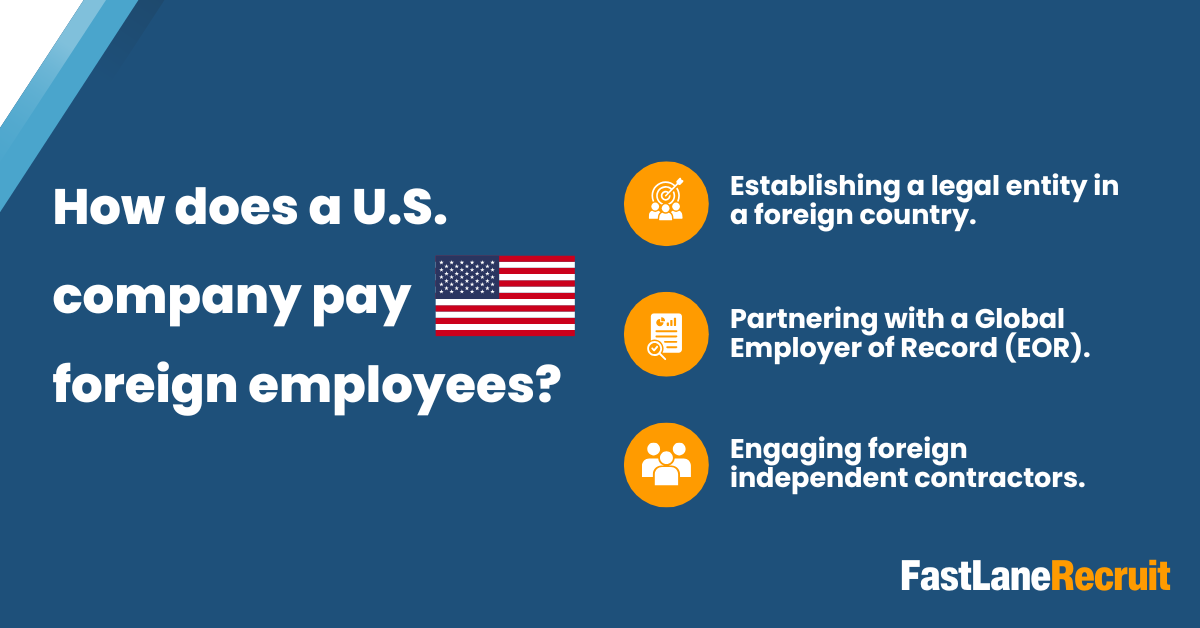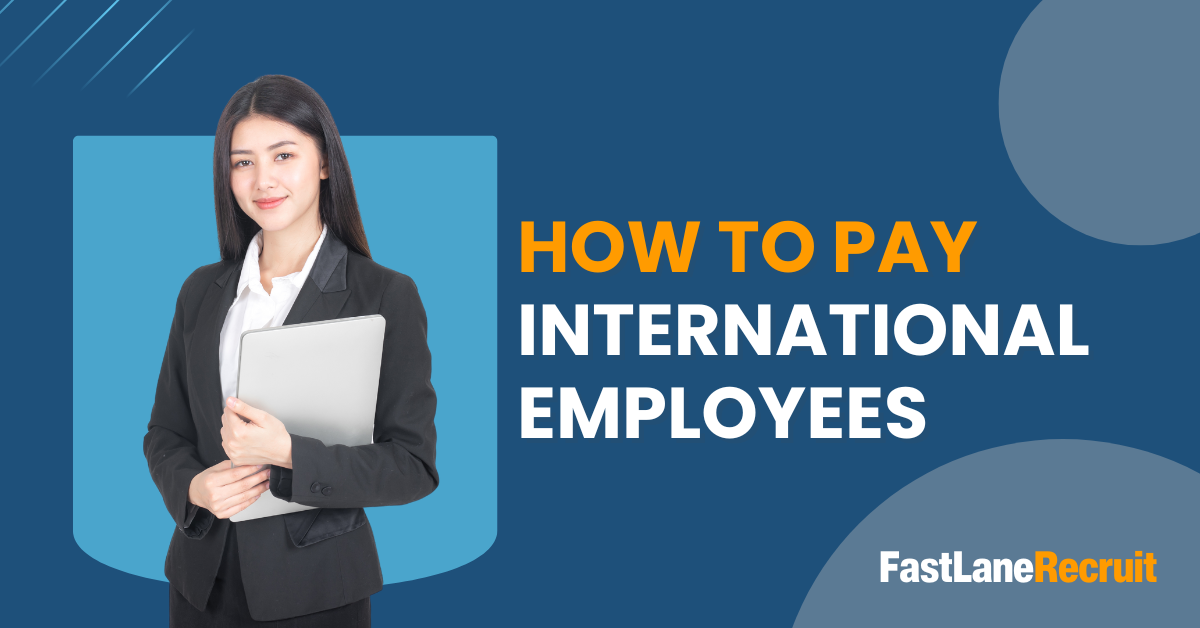Hiring across borders is no longer reserved for multinational giants. Startups, SMEs, and remote-first companies are now tapping into international talent to stay competitive. However, paying international employees involves navigating tax codes, labor laws, and banking regulations that vary widely from one country to another.
In this blog, we will outline options, such as setting up a local entity, working with an Employer of Record (EOR), or hiring contractors, along with the pros, cons, and compliance implications of each. Whether you’re entering Southeast Asia, Europe, or LATAM, understanding these models is essential to mitigate risk and control costs.
Content Outline
Key Summary
Understand worker classification and PE risks when hiring internationally.
Explore local entities for long-term operations and EOR for fast, compliant hiring.
Consider contractors for short-term or flexible arrangements, but assess compliance risks.
Factor in total employment cost, not just salary.
FastLaneRecruit helps employers navigate global payroll and EOR complexities in Malaysia.
How does a U.S. company pay foreign employees?
For a U.S. company looking to employ staff overseas, it’s not as simple as transferring funds to a foreign account. The IRS requires employers to classify workers properly, either as employees or independent contractors, based on behavioral control, financial control, and the nature of the relationship. Learn more about this from the IRS official guidance.
Additionally, you need to consider whether hiring internationally creates a permanent establishment (PE) in the foreign country, which may trigger corporate tax obligations. Consulting with legal and tax professionals is highly recommended before onboarding employees abroad.
There are generally three ways a U.S. company can pay foreign employees:
- Establishing a legal entity in a foreign country.
- Partnering with a Global Employer of Record (EOR).
- Engaging foreign independent contractors.
Each option has its unique regulatory, cost, and administrative considerations.
Also Read: Benefit of Outsourcing Accounting to Malaysia

Set up a legal entity in the foreign country
Establishing a local subsidiary or branch is often the most comprehensive and sustainable option if you’re committed to long-term operations in a country. This involves:
- Registering a legal entity with local authorities (e.g., Companies Commission of Malaysia or Singapore’s ACRA).
- Opening a corporate bank account in the local currency.
- Registering with local tax and labor authorities.
- Appointing local directors or representatives where required.
For instance, in Malaysia, you must register with the Companies Commission of Malaysia (SSM) and comply with LHDN (Inland Revenue Board) for tax and SOCSO for employee social security.
Pros:
- Full control over employment terms, policies, and compliance.
- Greater brand presence in the market.
- Easier to manage long-term employee engagement.
Cons:
- High setup costs and ongoing administrative overhead.
- Takes several weeks or months to become fully operational.
- Requires local legal and accounting expertise.
This route is best for companies that plan to hire a large team or make a long-term commitment to a market.
Also Read: How to Effectively Hire and Manage Remote Employees: A Comprehensive Guide
Partner with an EOR
An Employer of Record (EOR) is a third-party organization that legally employs workers on your behalf in their local country. The EOR handles:
- Employment contracts
- Payroll processing
- Tax and social security contributions
- Local labor law compliance
- Onboarding and offboarding
You continue to manage the employee’s day-to-day tasks and performance.
For instance, if you’re hiring in Malaysia through FastLaneRecruit’s EOR services, we handle registration with EPF, SOCSO, and LHDN, while you remain in full operational control.
Good For:
- Quick market entry: Employees can start in days.
- No need for a local entity.
- Reduced legal risk: Compliance is the EOR’s responsibility.
EORs are ideal for market testing, hiring a few remote employees, or setting up distributed teams without committing to a full entity.
Also Read: Guide to PEO vs EOR
What is the total cost of employment for international employees?
When calculating the Total Employment Cost (TEC) for international employees, it’s essential to go beyond the base salary. The TEC usually includes:
- Gross salary
- Employer contributions (e.g., pension, social security, health insurance)
- Mandatory statutory benefits (e.g., leave entitlements, bonuses)
- Payroll processing and admin fees
- Insurance and other fringe benefits
Global Employment Cost Comparison Table
| Country | Gross Salary (USD/month) | Employer Tax/Contributions | Admin/Payroll Costs | Approx. Total Cost |
| Malaysia | $2,000 | 16% (EPF, SOCSO, EIS) | $200 (via EOR) | $2,600 |
| Singapore | $3,500 | 17% (CPF) | $250 (via EOR) | $4,345 |
| Philippines | $1,500 | 14% (SSS, PhilHealth, Pag-IBIG) | $180 | $2,090 |
| U.S. | $5,000 | 7.65% (FICA) + insurance | $200 | $5,800 |
Always verify the latest statutory rates with official sites like IRAS (Singapore), BIR (Philippines), or LHDN (Malaysia).
Alternatives to Paying International Employees
Not every international hire requires a full employment contract. Depending on your company’s goals, budget, and the nature of the work, there are alternative ways to engage talent abroad. These alternatives can be more flexible and cost-effective, especially for short-term or project-based needs. However, they also come with their own risks and compliance considerations.
1. Hire and Pay Overseas Contractors
One of the most common alternatives is to engage international talent as independent contractors or freelancers. Contractors are self-employed individuals or entities who provide services to your company under a service agreement, not an employment contract.
Key steps to hire contractors compliantly:
- Draft a clear Service Agreement that outlines deliverables, payment terms, deadlines, and IP ownership.
- Ensure they submit relevant tax documentation such as the W-8BEN form (for non-U.S. individuals) or equivalent forms for your jurisdiction.
- Pay them using secure international payment platforms like Wise, Payoneer, or PayPal, or via direct international bank transfers.
- Confirm the contractor complies with local tax and business registration laws in their country (many countries require contractors to register as self-employed or as a sole proprietorship).
Pros:
- Flexible and project-based.
- No need for social security contributions, benefits, or ongoing payroll administration.
- Faster onboarding and easier offboarding.
Cons:
- Risk of misclassification—if local authorities deem your contractor to be a de facto employee, your business could face penalties, back taxes, or legal claims.
- Less control over their availability, time allocation, and tools used.
- It may be restricted in certain jurisdictions where laws favor full employment relationships.
Example: In Malaysia, consistent, full-time work performed under the control of the hiring company, even by a “contractor”, may legally be considered employment under Section 2 of the Employment Act 1955. To avoid risks, many businesses opt for EOR services or short-term contracts under proper legal frameworks.
2. Use Staffing Agencies or Local Third-Party Firms
Staffing or outsourcing firms in a foreign country can employ talent on your behalf and lease their services to you. This model is useful for industries like manufacturing, logistics, and customer service.
Pros:
- Offloads legal liability and payroll compliance to the staffing firm.
- Offers workforce scalability during high-demand seasons.
- Often bundled with recruitment services.
Cons:
- Higher markup rates due to agency fees.
- Less integration with your internal company culture or systems.
- Varies greatly in reliability depending on the local partner.
3. Offer Short-Term Remote Work or Digital Nomad Agreements
For highly mobile professionals or trial projects, you might consider temporary remote work agreements. Some countries now offer digital nomad visas that allow foreigners to live and work legally without being directly employed by a local company.
Examples of countries offering digital nomad visas:
- Estonia
- Portugal
- Malaysia (DE Rantau Nomad Pass) – Learn more at MDEC Malaysia
This is a good option if:
- The work is remote-friendly.
- The employee does not require local benefits or long-term residence.
- You want to avoid setting up an entity or using EOR for short periods.
Note: Make sure your company is not triggering permanent establishment risks even under a nomadic scenario.
While alternatives such as contractors or third-party vendors offer flexibility, they must be approached with caution and legal oversight. Inconsistent classification or poor compliance can result in costly fines and reputational damage. Businesses must evaluate each alternative based on local laws, work duration, and operational control.
When in doubt, consult with a global HR partner like FastLaneRecruit, which can advise you on the most compliant and cost-effective path forward.
Challenges and risks with global payroll
Managing payroll across borders involves unique challenges, including:
- Legal compliance: Staying current with changing tax and labor laws is difficult, especially in developing markets.
- Employee misclassification: Incorrectly classifying contractors as employees can lead to fines and back taxes.
- Currency fluctuations: Paying in foreign currencies can expose both the employer and employee to exchange-rate volatility.
- Data privacy: GDPR, PDPA (Malaysia), and other privacy laws require secure storage and processing of employee data.
- Administrative overhead: Different tax calendars, filing requirements, and benefit systems can overwhelm internal HR teams.
Partnering with an experienced payroll provider like FastLaneRecruit can help mitigate these risks.
Streamline payroll for international employees
To ensure smooth global payroll operations:
- Centralise data and workflows using cloud-based HR tools.
- Integrate local payroll platforms (e.g., Talenox for Singapore & Malaysia).
- Automate tax and compliance reporting through integrations with tax authorities.
- Consolidate payment cycles and generate unified reports for finance teams.
- Engage trusted partner like FastLaneRecruit for complete end-to-end payroll and EOR services.
Conclusion
Paying international employees doesn’t need to be complex. By understanding your options, whether it’s setting up a legal entity, partnering with an EOR, or hiring contractors, you can structure your global workforce strategy around compliance, flexibility, and scalability.
With FastLaneRecruit’s global expertise and local execution, you can confidently expand your workforce into Malaysia and beyond.
FastLaneRecruit Helps Employers with EOR & Payroll Services in Malaysia
FastLaneRecruit is your trusted partner for expanding into Malaysia. We help you hire, onboard, and pay local employees without the need for a local entity. Our services include:
- Drafting compliant employment contracts in both Bahasa Malaysia and English
- Registering and managing EPF, SOCSO, EIS, and tax submissions
- Handling monthly payroll processing and statutory reporting
Whether you’re a startup testing the Malaysian market or a scaling business building out a regional hub, FastLaneRecruit simplifies your employment journey in Malaysia. Contact us to discuss your needs!


